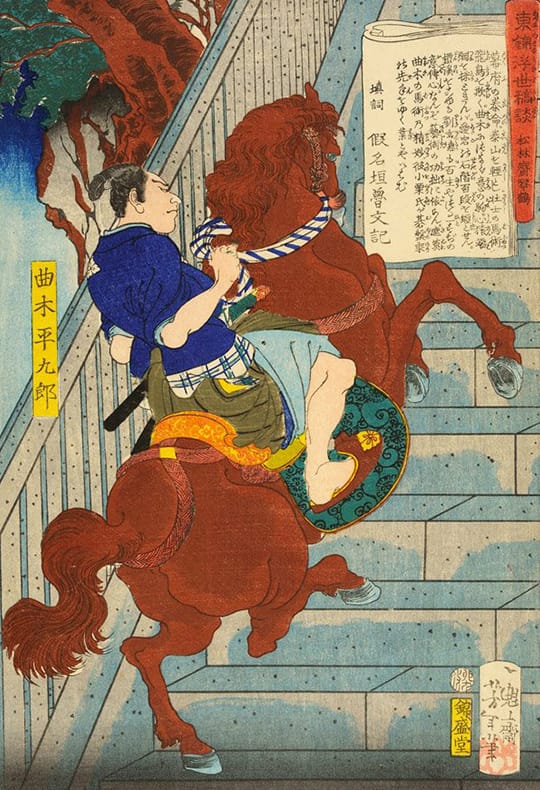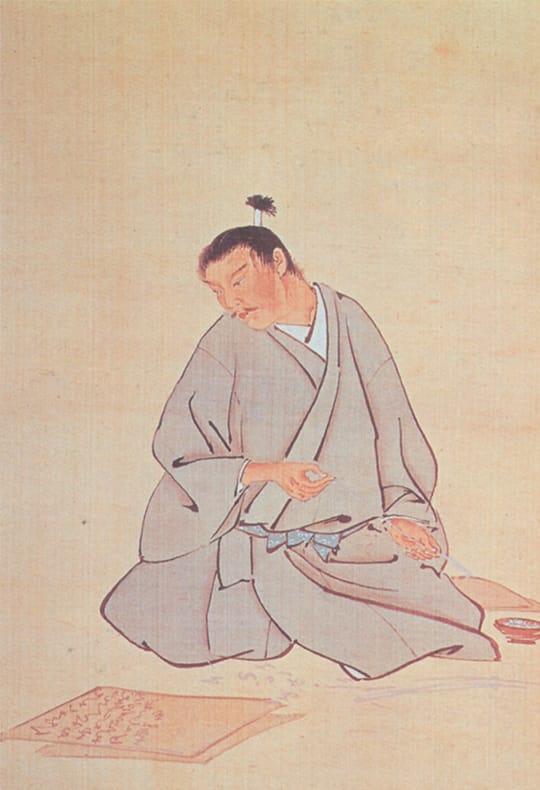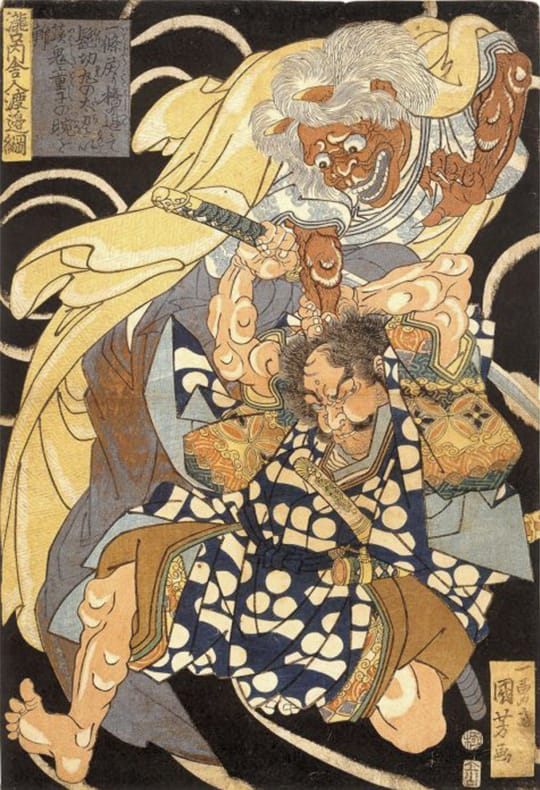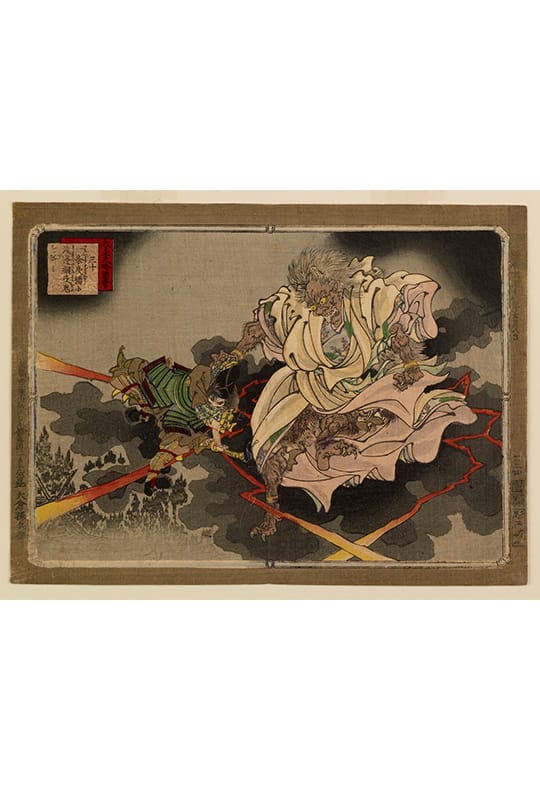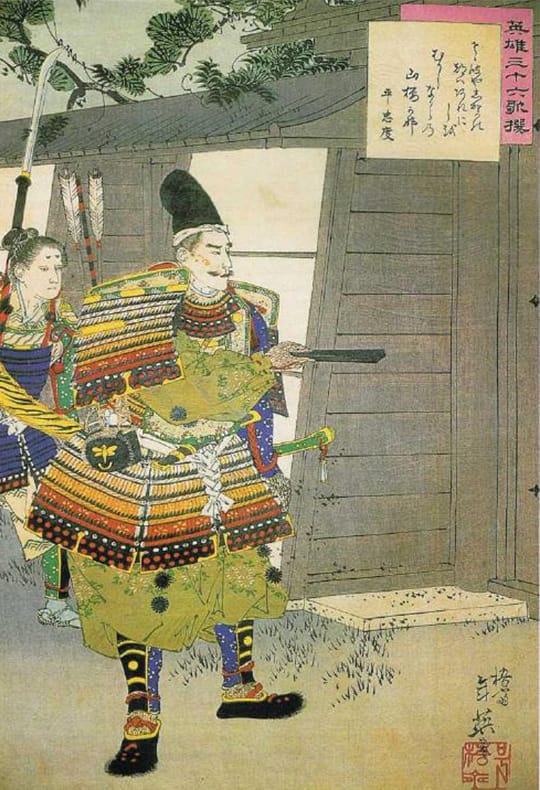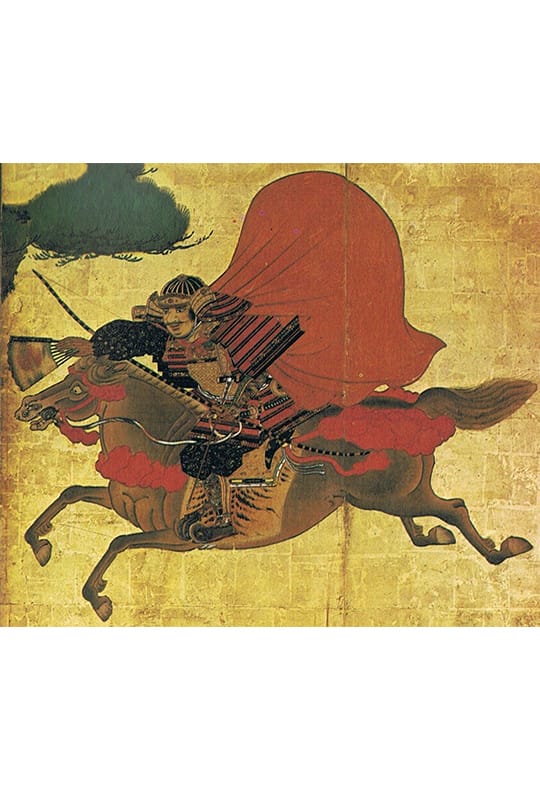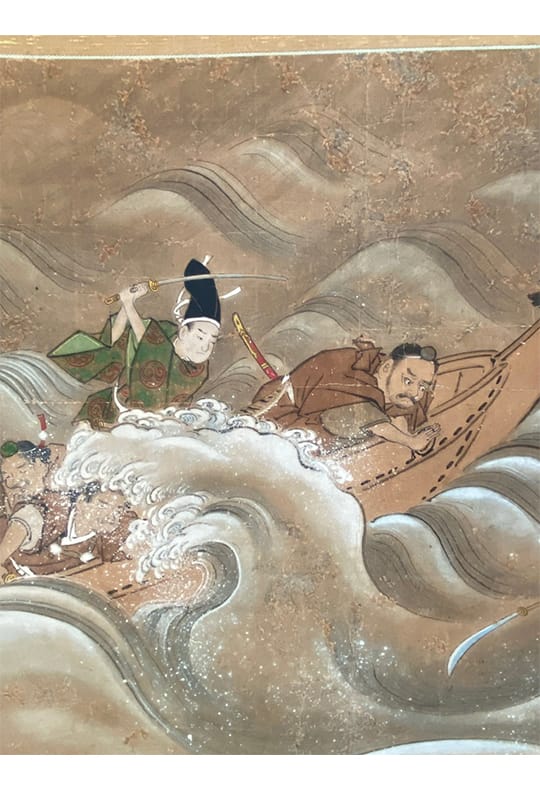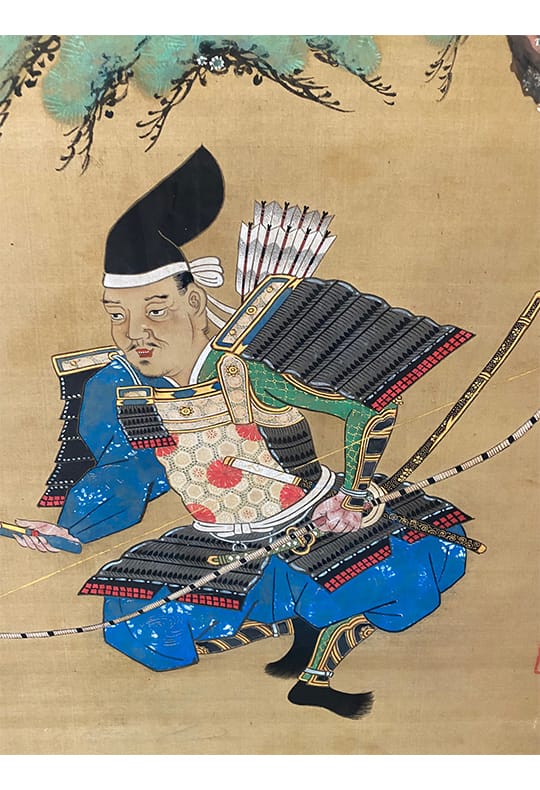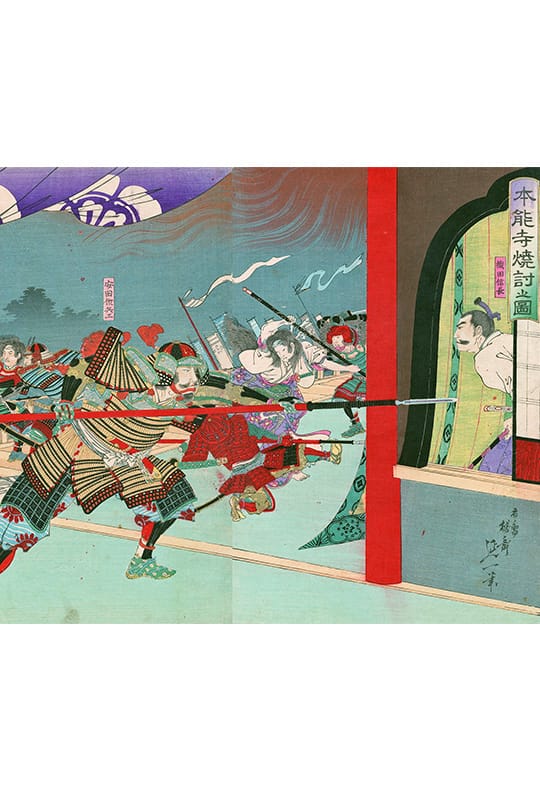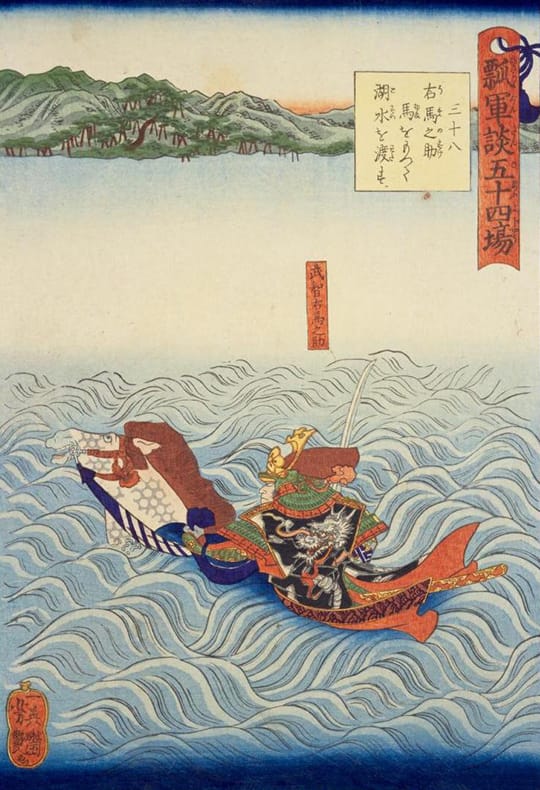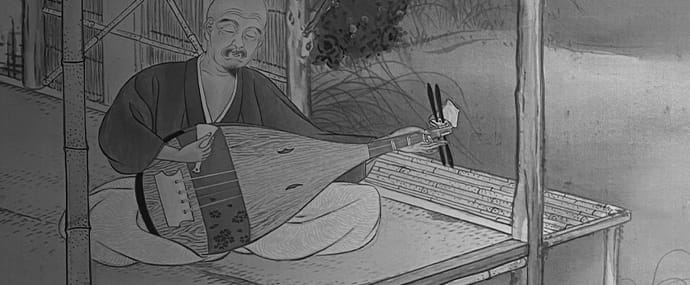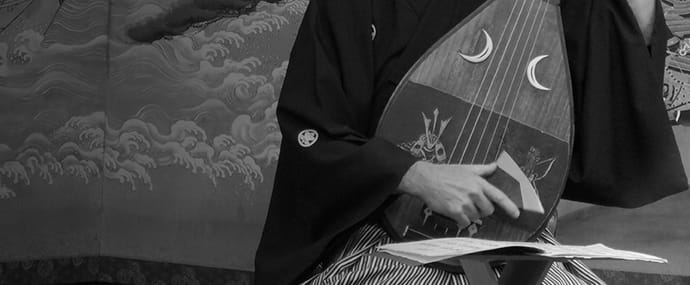Meiji Period-search

kyara no kabuto
伽羅の兜
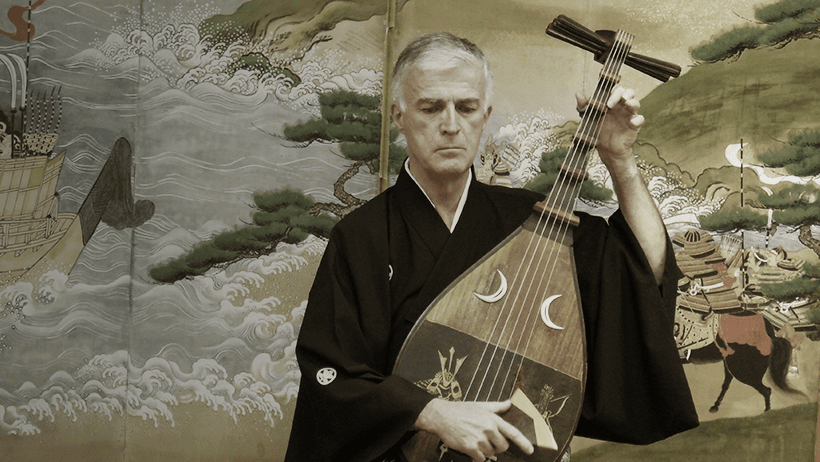
Introduction
In the eleventh month of 1614, TOKUGAWA Ieyasu and the troops led by the various daimyō under his command, attacked Osaka Castle where TOYOTOMI Hideyori, the son of the late TOYOTOMI Hideyoshi, had entrenched himself. Negotiations of peace between the two were held in the twelfth month; however, the following year, 1615, hostilities again opened. The TOYOTOMI faction was crushed and Hideyori and his mother, Yododono, both committed suicide, which brought the TOYOTOMI clan to an end. Hideyori’s retainer, KIMURA Shigenari, engaged with II Naotaka’s forces on the 2nd of June in the Battle of Wakae, and was killed during the battle.
The military figures belonging to the TOYOTOMI faction that participated in the military struggles of the Fuyu no jin (Winter Battle of Osaka) and Natsu no jin (Summer Battle of Osaka) frequently appeared in the literary works of the successive ages. Due to the governmental restrictions during the Edo period (1603-1867) that forbade the publication of any materials that contained the names of figures associated with the TOKUGAWA family, these works spread through manuscripts known as jitsuroku, or “true records”. Among the numerous jitsuroku, a series of war tales of Osaka, the Naniwa Senki, (War Tales of Osaka) were created. Despite their being called jitsuroku, or “true records”, many of them are highly fictionalised accounts, the fictional element increasing with the passage of time. The story of KIMURA Shigenari’s perfumed helmet and the head inspection in the war’s aftermath is found in several sources; the details, however, vary. Jitsuroku became popular with their recitation by storytellers (kōshakushi) during the Edo and Meiji periods. During the Meiji period, there were numerous Kabuki plays produced that included KIMURA Shigenari (among many others) and- TSUBOUCHI Shōyō’s Kirihitoha (1894-1895) being a representative works.
Synopsis
This ballad tells the story of an outstanding young samurai and his devoted wife. From the many military struggles which finally ended at the beginning of the 17th century, several episodes of exemplary samurai behaviour have been transmitted. One of the most famous and remarkable tales is the Perfumed Helmet.
The second of the three great warlords of this era, TOYOTOMI Hideyoshi, had died and the third, TOKUGAWA Ieyasu, the founder of a new political dynasty, was using any means to gain the upper hand. Faithful retainers of the TOYOTOMI side opposed him, but were unsuccessful since Ieyasu troops were much larger than all else at that time.
On the eve of a battle in 1615, the young warrior KIMURA Shigenari, faithful to the TOYOTOMI clan, knew that the following day would be his last. He spent the evening with his wife singing the Noh chant of Atsumori’s death in Suma and exchanged the parting sake cup with her. Anxious over his having eaten nothing the entire day and worried that he would thus be too weak for battle, she expressed her concern and asked why. He explained that he has no desire to have the contents of his stomach spill forth should his throat be cut in the next day’s battle. The prospect of dying so disgracefully was more than he could bear. His wife, moved by this comment, leaves the room. When some time later Shigenari calls her and she does not answer, he goes to look for her. He discovers her body on the floor, where she had taken her own life, and a gracefully written note nearby telling him that she had left for the world ahead and would be waiting there for him.
Shigenari is devastated, but folds his hands in prayer, and then prepares his armour for departure to the battlefield. When he takes his helmet in hand, he smells kyara (aloes wood), the most precious of incenses. His wife had perfumed the helmet, and her act of noble consideration moved him deeply.
After putting on his helmet the following day, the perfume inspired Shigenari to extraordinary feats of military prowess, but he nevertheless succumbed. The next day, Ieyasu was deeply impressed when he recognised the scent imparted by the helmet during an inspection of the heads taken in battle, and lauded the 22-year-old Shigenari as an exemplary warrior.

Lyrics
-
1. With Taikō’s death, the splendid and Nach dem Tod von Taikō lösten sich
Taikō yukite gaisei no 太閤逝きて蓋世の
-
2. grand plans of his reign vanished, but at Osaka Castle, die Zukunfts-Pläne seiner Herrschaft auf ins Nichts.
yūto wa izuko Osakajō 雄図はいづこ大阪城
-
3. despite the presence of many loyal retainers, Denn im Schloss von Osaka – trotz manch ergebenem Gefolgsmann –
chūshin gishi wa arinagara 忠臣義士はありながら
-
4. the intolerant and spiteful had spread, growing thickly, machten sich bald üble Kerle breit,
shōjin uchi ni habikorite 小人内にはびこりて
-
5. now trapped in TOKUGAWA Ieyasu’s verstrickt in Ränke und Intrigen,
ima wa TOKUGAWA Ieyasu no 今は徳川家康の
-
6. cunning and deceitful ruse. die der tückenreiche TOKUGAWA Ieyasu gesponnen hatte.
sono jutchū ni ochiireru 其の術中に陥れる
-
7. What fate awaits the TOYOTOMI Was bedeutete dies für das Haus der TOYOTOMI?
kaun no sue o ikanisen 家運の末を如何にせん
-
8. With this, the treaty between the two houses, Der Vertrag der beiden Häuser
satemo TOYOTOMI TOKUGAWA no さても豊臣徳川の
-
9. the TOKUGAWA and the TOYOTOMI, was again shredded. TOKUGAWA und TOYOTOMI hatte keine Rechtskraft mehr.
wagi wa futatabi yabureshikaba 和議は再び破れしかば
-
10. From all directions, the armies of the East So konnte man denn bald von weither
kantōzei wa shodō yori 関東勢は諸道より
-
11. and their onslaught as they approached, could be heard. Schlachtenlärm der Truppen aus dem Osten hören.
semeyosekitaru to kikoekeri 攻め寄せ来ると聞えけり
-
12. KIMURA Nagatonokami Shigenari, KIMURA Nagatonokami Shigenari,
koko ni TOYOTOMI Udaijin Hideyori no shin 爰に豊臣右大臣秀頼の臣
-
13. A retainer of Hideyori, the Minister of the Right, ein Vasall von Hideyori, Minister zur Rechten,
KIMURA Nagatonokami Shigenari wa 木村長門守重成は
-
14. thought that if he failed this time sagte sich im stillen: wenn ich dieses Mal
kotabi wa Ōgosho Ieyasu no こたびは大御所家康の
-
15. to claim Ieyasu’s head den Kopf von Ieyasu nicht holen kann,
kubi o wagate ni agezareba 首を我手にあげざれば
-
16. he would not return alive. dann möchte ich nicht lebend mehr nach Hause kehren.
ikite futatabi kaeraji to 生きて再び還らじと
-
17. Resolutely accepting his fate, Er entschied sich ohne Zaudern, dieses Schicksal anzunehmen,
kakugo sadamete konjō no 覚悟定めて今生の
-
18. He turned to his wife, Shiragiku, und so wandte er sich seiner Gattin Shiragiku zu.
nagori ni tsuma no Shiragiku to 名残に妻の白菊と
-
19. with whom he exchanged the cup of final parting. Er reichte ihr den Abschiedstrunk
wakare no sakazuki kumikawashi 別れの杯酌み交し
-
20. He struck his shoulder drum und schlug die Schultertrommel
yagate tsuzumi o shirabetsutsu やがて鼓を調べつゝ
-
21. to accompany himself as he chanted a section from Suma, the Noh play. zur Begleitung von Gesängen aus dem Noh-Stück Suma.
utō ya Suma no ikkyoku ni 謡ふや須磨の一曲に
-
22. Appearing unaware of the summer nights’ brevity, Ihn kümmerte es nicht, dass diese Nacht so kurz war –
Naniwa no ashi no mijikayo mo 難波の葦の短夜も
-
23. short as the reeds of Naniwa. kurz wie Riedgras in der Bucht von Naniwa.
fukuru o shiranu fuzei nari 更くるを知らぬ風情なり
-
24. Shiragiku was still young, Shiragiku war noch jung,
Shiragiku toshi wa wakakeredo 白菊齢は若けれど
-
25. and as expected, her admirable heart und liebte ihren Gatten sehr.
sasuga kenage no kokoro yori さすが健気の心より
-
26. agonized over her husband. Sie machte sich um ihn viel Sorgen.
otto no minoue ureitsutsu 夫の身の上憂ひつゝ
-
27. “At a time like this, to so calmly „Dass du jetzt gar leichthin
ko no go ni nozomi yūyū to 此の期に臨み悠々と
-
28. pursue these very pleasures dich so vielen Freuden und Vergnügen hingibst,
asobi tanoshimi tamō koso 遊び楽しみ給ふこそ
-
29. is most regrettable and a source of great concern. stimmt mich traurig, macht mein Herz mir schwer.
ito mo hoinaku omōyure いとも本意なくおもほゆれ
-
30. From this morning, Seit heute morgen
wakete kesa yori wa ichiryū no わけて今朝よりは一粒の
-
31. you have eaten nothing, not even the smallest of meals. hast du nichts gegessen, nicht ein einzig Reiskorn.
onshokuji sae meshi tamawazu 御食事さへ召し給はず
-
32. If you are to depart for Wenn du morgen in die Schlacht ziehst,
moshimo kono mama senjō ni 若しも此まゝ戦場に
-
33. the battlefield in your present state, wird in diesem Zustand dich
idesase tamou koto naraba 出でさせ給ふことならば
-
34. your habitual courage will be dulled. dein Mut schon bald verlassen.
higoro no yūki mo niburasete 日頃の勇気も鈍らせて
-
35. And the conduct and comport you so deeply desire, Deine Haltung, die dir immer wichtig war,
omoi no mama no onhataraki mo 思ひのまゝの御働きも
-
36. what will become of this?” She bravely was soll denn aus ihr werden?”
ikaga aran to kaigaishiku 如何あらんとかひがひしく
-
37. remonstrated with the sincerest devotion. sprach sie kummervoll, ihm innig zugetan.
magokoro komete zo isamekeru 真心こめてぞ諌めける
-
38. Shigenari straightened, and said: Shigenari setzt’ sich aufrecht hin:
Shigenari katachi o aratamete 重成容を改めて
-
39. “Perhaps you have yet to hear how in the past, „Ich muss dir Folgendes aus alter Zeit berichten:
somoji kikazuya sono mukashi そもじ聞かずや其の昔
-
40. a retainer of HACHIMAN Tarō, Einem Lehensmann von HACHIMAN Tarō,
HACHIMAN Tarō no miuchi ni te 八幡太郎の御内にて
-
41. a warrior called SUEWARI Shirō, dem Ritter SUEWARI Shirō,
SUEWARI Shirō to ieru musha 末割四郎といへる武者
-
42. had his throat pierced by an arrow, wurde im Gefecht der Hals von einem Pfeil durchbohrt.
teki ni nondo o itōsare 敵に喉を射通され
-
43. and from the open wound, his last meal spewed forth. Da spritzte ihm aus offner Wunde seine letzte Mahlzeit.
sono kizuguchi yori ii hakiide 其の傷口より飯吐き出で
-
44. To meet such an unseemly end, Einen solchen Tod zu sterben und in dieser Weise
minikuki saigo o togeshi tozo 醜き最期を遂げしとぞ
-
45. to have this shame remain in the world in der Nachwelt in Erinnerung zu bleiben,
kakaru chijoku o nochi no yo ni 斯る恥辱を後の世に
-
46. is something I cannot bear. wäre eine Schande, die ich nicht ich nicht ertragen könnte.
nokosan koto o kizukaite 残さんことを気遣ひて
-
47. This is why I have not eaten.” Deshalb also hab‘ ich heute nichts zu mir genommen.“
ware wa shokuji o toranuzo to 吾は食事を取らぬぞと
-
48. With these words, Shiragiku Als Shiragiku dies hörte, wurde ihr bewusst,
ieru kotoba ni Shiragiku wa 云へる言葉に白菊は
-
49. recognized his graceful, yet manly, wie nobel und wie mannhaft
genimo otto no isagiyoki 実にも夫のいさぎよき
-
50. acceptance, and was again sich ihr Gatte in sein Schicksal fügte.
kakugo no hodo o imasarani 覚悟の程を今さらに
-
51. enlightened and deeply moved. Tief bewegt, doch
satorite fukaku kanjiiri 悟りて深く感じ入り
-
52. Without the slightest change in her expression, ohne eine Regung im Gesicht
nanigenaki sama yosooite 何気なき様装ひて
-
53. she abruptly left. erhob sie sich und ging hinaus.
futo sono seki o tachisarinu ふと其席を立去りぬ
-
54. And when the time of his departure Es kam die Zeit der Vorbereitung,
kakarishi hodo ni shutsujin no 斯りし程に出陣の
-
55. for the front drew near, um ins Feld zu ziehen.
jikoku semareba Shigenari wa 時刻迫れば重成は
-
56. Shigenari called Shiragiku twice, thrice, Da rief Shigenari zwei-, ja dreimal nach Shiragiku,
futatabi mitabi Shiragiku o 二度三度白菊を
-
57. but as there was no response, doch er hörte keine Antwort,
yobedo kotae no arazareba 呼べど答のあらざれば
-
58. he sought her in their private chambers. und so suchte er nach ihr in ihrem eigenen Gemach.
tsune no ima e to yuki miru ni 常の居間へと行き見るに
-
59. What was this! „Was soll denn das!“
ko wa somo ikani nanigoto zo こはそも如何に何事ぞ
-
60. A short blade had pierced her throat, Da hatte eine kurze Klinge ihr den Hals durchbohrt,
kaiken nondo o tsuranukite 懐剣喉を貫きて
-
61. and stained in crimson, she lay. sie schwamm im Blut, am Boden hingestreckt.
ake ni somarite uchifuseri 朱に染りて打伏せり
-
62. Shigenari, shocked, lifted her in his arms, Shigenari traf der Schlag; er nahm die Gattin in die Arme.
Shigenari odoroki dakiagureba 重成驚き抱き上ぐれば
-
63. but her soul had vanished Doch sie war bereits verschieden,
haya tama no o mo taehatete 早玉の緒も絶え果てゝ
-
64. and no art remained to revive her. nichts vermochte Shiragiku wieder zu beleben.
hodokosu sube mo nakarikeri 施す術もなかりけり
-
65. He saw nearby a note left behind, Neben ihr bemerkt’ er einen Abschiedsbrief –
atari o mireba ippū no kakioki 傍を見れば一封の遺書
-
66. which he hastily took in hand, den nahm er schnell zur Hand und las die Worte:
toru te ososhi to yomikudaseba 取る手遅しと読み下せば
-
67. “I cross the Mountain of Death ahead of you, „Übern Berg des Todes gehe ich vor dir
hitoashi saki ni shide no yama 一足先に死出の山
-
68. and shall await in the Other World,” und warte in der andern Welt auf dich“,
koete meido ni matan to no 越えて冥土に待たんとの
-
69. written in an exquisite hand. stand wunderschön von ihrer Hand geschrieben.
ito uruwashiki fude no ato いと麗はしき筆の跡
-
70. With commendable resignation, Shigenari Shigenari schickte sich mit Würde in sein Los
shushō no kakugo ni Shigenari wa 殊勝の覚悟に重成は
-
71. closed his eyes in prayer. und schloss die Augen zum Gebet.
shibashi meimoku gasshō shi 暫時瞑目合掌し
-
72. He prepared for his departure, Dann rüstete er sich
yagate kadode no yōi o totonoe やがて門出の準備を整へ
-
73. and when at last, he took his helmet in hand, und griff nach seinem Helm.
iza to kabuto o te ni toreba いざと兜を手に取れば
-
74. a precious incense perfumed the air. Welch wunderbare Düfte strömten aus der Lade ihm entgegen.
naka yori kaoru meikō wa 中より薫る名香は
-
75. In the end, Shiragiku Shiragiku hatte noch vor ihrem Hinschied
imawa no kiwa ni Shiragiku ga 今はの際に白菊が
-
76. had burnt incense, imbuing it with her deepest thoughts. in der liebevollsten Absicht Räucherwerk gezündet.
kokoro to tomo ni takikomeshi 心と共に焚き籠めし
-
77. Recognizing her considerate and graceful gesture, Dieses Mitgefühl bewegte Shigenari tief,
sono tashinami to shirarekeri 其のたしなみと知られけり
-
78. Shigenari’s bravery increased a hundredfold. es schürte seinen Kampfgeist über alle Maßen.
ima wa yūki mo hyakubai shi 今は勇気も百倍し
-
79. Roused, he mounted his spirited steed, Tatendurstig schwang er sich aufs Streitross,
hayari ni hayaru wakakoma ni 逸りにはやる若駒に
-
80. and departed for the front in the saddle. spornt’ es an und zog ins Feld.
uchimatagarite shutsujin su 打ち跨りて出陣す
-
81. With the fading moon of dawn, the cock crowed once again, Zum zweiten Male kräht der Hahn, der Mond ist blass geworden.
shinkei futatabi naite zangetsu usuku 晨鶏再ビ鳴イテ残月薄ク
-
82. and the warhorses impatiently neighed as the men departed. Die Pferde wiehern wie im Wahn, es reiten weg die Horden.
seiba shikiri ni inanaite kōjin izu 征馬連リニ嘶イテ行人出ヅ
-
83. It was the first year of the Genna era, Jetzt, im ersten Jahr der Genna-Zeit,
tokishimo Genna gannen no 時しも元和元年の
-
84. the sixth day of the fifth month, and in the clouds to the East, am 6. Tag des 5. Monats breiten sich im Osten Wolken aus
gogatsu muika no shinonome mo 五月六日の東雲も
-
85. with the spreading light of early dawn, im frühen Licht des Morgenhimmels
haya honobono to akewataru 早ほのぼのと明け渡る
-
86. the flags fluttered in the skies. flattern weithin Flaggen überall.
sora ni nabikuya hatasashimono 空に靡くや旗指物
-
87. The approaching enemy troops, Die Truppen, die im Aufmarsch sind,
chikazuku teki no gunzei wa 近づく敵の軍勢は
-
88. under the command of II Naotaka, führt II Naotaka,
kantō ichi no gō no mono 関東一の剛の者
-
89. the most resolute warrior of the East, der große Feldherr aus dem Osten an;
II Naotaka ga hikiitaru 井伊直孝が率いたる
-
90. numbered ten thousand horsemen. er steht zehntausend Reitern vor.
ichiman yoki tozo shirarekeru 一万余騎とぞ知られける
-
91. Finding this sobering, Shigenari nonetheless faced them Auf diese Monstermacht stürzt Shigenari
ana monomonoshiya to Shigenari wa あな物々しやと重成は
-
92. with only some two thousand men. mit zweitausend Mannen nur.
nisen’ yoki nite kakemukai 二千余騎にて駆け向ひ
-
93. Suddenly charging his horse, Er lässt sein Pferd ins Pfeilgewitter traben,
yaniwa ni koma o odorasete 矢庭に駒を躍らせて
-
94. he penetrated deep into the enemy ranks. mitten in die Reihen seiner Gegner prescht er vor.
tekijin fukaku tsuite iru 敵陣深く突いて入る
-
95. The spear blades flashed and glittered Speeresspitzen gleißen
yari no hosaki wa inazuma no 槍の穂先は電光の
-
96. like lightning in the heavens. Blitzen gleich im Himmelslicht.
sora ni hirameku gotoku nite 空に閃く如くにて
-
97. Demon or devil, Kein Teufel und kein Dämon
ikanaru tenma onigami mo 如何なる天魔鬼神も
-
98. none could stand against him. kann ihm jetzt die Stirne bieten.
tekisen yōzo nakarikeru 敵せんやうぞなかりける
-
99. At one point, the courageous enemy general, Da, auf einmal stürmt ein wilder Feldherr,
kakaru tokoro ni teki no mōshō 斯る所に敵の猛将
-
100. IOWARA Suke’emon, came running, IOWARA Suke’emon heran,
IOWARA Suke’emon hasekitari 庵原助右エ門馳せ来り
-
101. stabbing and thrusting with his spear. wirft wuchtig seinen Speer auf Shigenari.
yari uchishigoki tsukikakaru o 槍打扱き突きかゝるを
-
102. Shigenari, unperturbed, engaged with the general, Unerschrocken hält ihm dieser stand,
Shigenari dōzezu watariai 重成動ぜず渡り合ひ
-
103. and they fought, as dragons fight with tigers, und beide kämpfen wie der Drachen mit dem Tiger,
ryūko no arasou gotoku nite 龍虎の争ふ如くにて
-
104. a brief yet ferocious contest of skills. Streich um Streich und Schlag auf Schlag.
shibashi hageshiku tatakaikeri 暫し劇しく戦ひけり
-
105. But the stalwart Shigenari, Dem tapfren Shigenari werden
sashimo tedare no Shigenari mo さしも手垂の重成も
-
106. suffered grievous wounds, tiefe Wunden zugefügt.
sukasho no fukade mi ni oite 数ヶ所の深手身に負ひて
-
107. and though his heart remained true, Zwar ist sein Mut noch ungebrochen,
kokoro wa yatake ni hayaredomo 心は弥猛に逸れども
-
108. he was soon surrounded, and no longer able to move, doch er wird nun eingekreist und ist somit verloren.
shintai tsui ni kiwamarite 進退遂に谷まりて
-
109. ended his life, a mere twenty-two years of age, Ach, ein zweiundzwanzig Jahre junges Leben geht zu Ende,
aware nijūnisai o ichigo to shi あはれ二十二歳を一期とし
-
110. like the dew on the reeds of Naniwa, wie ein Tropfen Tau von einem Schilfhalm fallend
Naniwa no ashi ni oku tsuyu no 難波の葦に置く露の
-
111. his bravery felled, a brilliant jewel scattered. in dem Ried von Naniwa – welch ein kühner Mann.
tama to chirishi zo isamashiki 玉と散りしぞ勇ましき
-
112. His helmet, redolent with Aloes wood incense, Sein Helm verströmte Duft von Aloe;
kyara takikomeshi sono kabuto 伽羅焚き籠めし其の兜
-
113. the ends of the chinstrap’s knot snipped er hatte dessen lange Riemen kurz geschnitten
shinobi no o sae kirisutete 忍びの緒さへ切り捨てゝ
-
114. as he knew then that as the valiant warrior he would vanish. wissend, dass sein Ritterleben heute sich vollenden werde.
inochi chijimeshi masurao ya 命縮めし益良雄や
-
115. At the ritual inspection of heads, In dem Ritual der Prüfung abgeschlagner Köpfe
kubi jikken no hare no ba ni 首実検の晴の場に
-
116. the enemy general, Ieyasu, said, sprach der General der feindlichen Armee, Ieyasu:
teki no taishō Ieyasu mo 敵の大将家康も
-
117. “Here is the exemplary warrior!” „Welch ein musterhafter Krieger!“
appare bushi no kagami zo to あっぱれ武士の鑑ぞと
-
118. and surpassing the flowers of Naniwazu, Wunderbarer als die Blumen in der Bucht von Naniwa
tataeshi homare wa Naniwazu no 称へし誉は難波津の
-
119. the praises were more fragrant than the blossoms, duftet dieses Lob
saku hana yori mo kanbashiku 咲く花よりも芳しく
-
120. their scent to linger for eternity. es duftet bis in alle Ewigkeit.
yorozuyo kakete niouran 万代かけて匂ふらん
Notes
1.Taikō… Originally, this name was bestowed on those who had held the rank of kanpaku, or advisor to the emperor; however, it often refers to TOYOTOMI Hideyoshi, the second of the Three Warlords of the “Period of the Warring States” (sengoku jidai) ca. 1467-1603. 5.TOKUGAWA Ieyasu…TOKUGAWA Ieyasu (1567-1616) was the third of the Three Warlords of the sengoku jidai (see note 1.) who actually pacified the country at the beginning of the 17th century. He established a dynasty of rulers, or shogunate”, which lasted more than 250 years (1600-1867), and known as the TOKUGAWA Period or Edo Period (1603-1867). 12. KIMURA Nagatonokami Shigenari… Shigenari was one of TOYOTOMI Hideyori’s chief retainers, and is said to have functioned as the Toyotomi faction ambassador during the peace-making after the Winter Battle in Osaka in 1614 (Fuyu no jin). 13. Hideyori… Hideyori was Hideyoshi’s surviving son, and had been designated the Minister of the Right (Udaijin) in 1605. 18. Shiragiku…Shigenari’s wife. Different sources give different names: she is also referred to as Aoyagi, for example. 21. Noh play Suma…This refers probably to the Noh piece Atsumori which tells the tragic story of a young warrior losing his life in the battle of Ichinotani close to the inlet of Suma in 1184 (see the ballad Kumagai to Atsumori). 22. The reeds of Naniwa… this expression derives from a famous poem by Lady Ise (9th /10th century): naniwagata / mijikaki ashi no / fushi no ma mo / awade kono yo o / sugushite yo to ya. Naniwa (a region in Osaka) was famous for the reeds that grew there, and were distinguished by closely spaced joints. The image of the reeds of Naniwa came to be linked with the image of short nights. 39. HACHIMAN Tarō… or MINAMOTO no Yoshiie (1039-1106), a representative GENJI warrior during the Heian period and known for his bravery. 40. SUEWARI Shirō… SUEWARI was a retainer of MINAMOTO no Yoshiie. The Ōshū Gosannen Ki, which recounts three years of battles in Ōshū, contains this gruesome anecdote of SUEWARI’s death. The large meal SUEWARI had eaten before departing for the front spilled from his throat when he was stabbed in the throat during the battle. 83. First year of the Genna era… This is the year 1615; however, as the actual change of the era name occurred on the thirteenth day of the seventh month: correctly speaking therefore, the end of the Natsu no jin (the Summer Battle of Osaka) was in the fifth month, which would have been Keichō 20. The exact date of the Battle of Wakae, however, is the 2nd of June 1615. 88. II Naotaka… II Naotaka was one of TOKUGAWA Ieyasu’s important retainers. 100. IOWARA Suke’emon… IOWARA Tomomasa, who was a retainer of II Naotaka and is said to have killed KIMURA Shigenari during the Battle of Wakae. 109. Twenty-two years of age…Shigenari’s age at the time of his death is unclear. According to another source, he was thirty-five. 112. Aloes wood… The Japanese term for this incense wood is kyara, and was a most precious substance.
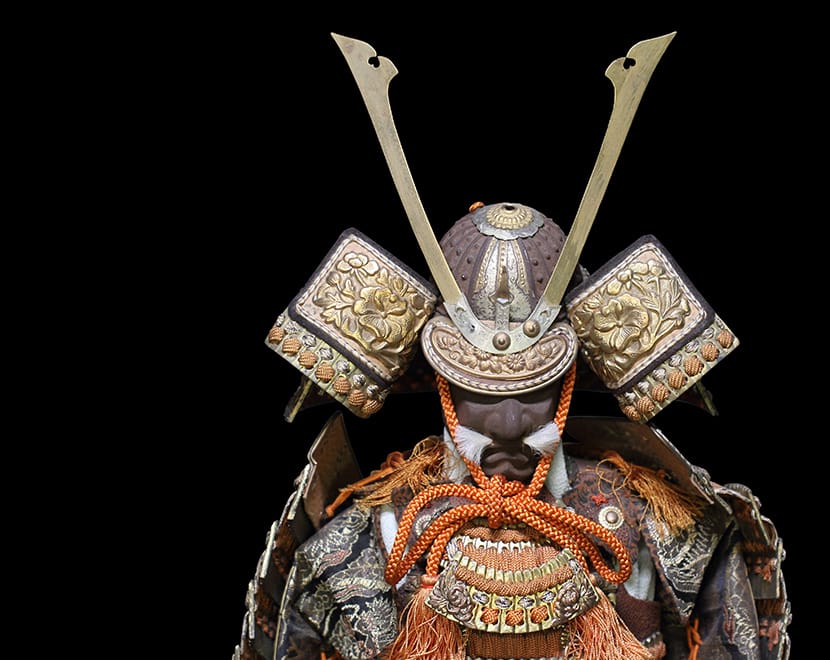
Music Notes
This ballad focuses on the moving relationship between the young and exemplary samurai KIMURA Shigenari and his wife Shiragiku, a model of spousal loyalty. In the Meiji period (1868-1912), however, another girl by the name of “Shiragiku” was better known as model of filial piety. The poem of OCHIAI Naobumi (1861-1903) “The Song of a Filial Daughter” praises a girl who fearlessly went out in search of her father whom she thought to be in trouble. This poem became so famous that it was translated into German and English at the time. In the first half of the 20th century, the heyday of chikuzen biwa, two different Shiragiku were held as ideals of virtue. This explains why in the instrumental repertoire we find, and among those lyrical interludes named after flowers, not only an interlude called Kiku (Chrysanthemum, and thus connected with the emperor), but also one called Shiragiku (White Chrysanthemum).

It is no surprise that the Shiragiku-interlude is used at a crucial point in this ballad. It is played after line 77 when Shigenari realizes that his beloved wife Shiragiku has thoughtfully perfumed his helmet. After this interlude, the mood changes in line 78 with the start of the battle-scenes sung with a strong voice in the highest vocal register.
